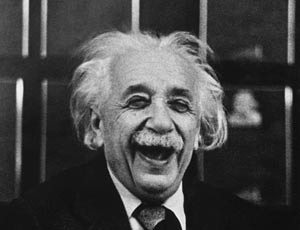
I guess the letter speaks for itself, but I doubt that Einstein got the last laugh.
Posted on 05/12/2008 6:22:59 PM PDT by Aristotelian
"Science without religion is lame, religion without science is blind." So said Albert Einstein, and his famous aphorism has been the source of endless debate between believers and non-believers wanting to claim the greatest scientist of the 20th century as their own.
A little known letter written by him, however, may help to settle the argument - or at least provoke further controversy about his views.
Due to be auctioned this week in London after being in a private collection for more than 50 years, the document leaves no doubt that the theoretical physicist was no supporter of religious beliefs, which he regarded as "childish superstitions".
Einstein penned the letter on January 3 1954 to the philosopher Eric Gutkind who had sent him a copy of his book Choose Life: The Biblical Call to Revolt. The letter went on public sale a year later and has remained in private hands ever since.
In the letter, he states: "The word god is for me nothing more than the expression and product of human weaknesses, the Bible a collection of honourable, but still primitive legends which are nevertheless pretty childish. No interpretation no matter how subtle can (for me) change this."
Einstein, who was Jewish and who declined an offer to be the state of Israel's second president, also rejected the idea that the Jews are God's favoured people.
"For me the Jewish religion like all others is an incarnation of the most childish superstitions.
(Excerpt) Read more at guardian.co.uk ...

I guess the letter speaks for itself, but I doubt that Einstein got the last laugh.
“God does not play dice” was Einstein’s retort to quantum uncertainty. He believed his own beliefs, and just as many people of faith did, scorned the beliefs of others.
Doubt is fine, wait till some idiot shows up and claims to know it...
At least he tried to find some answers. Interesting article.
And this is the man who has replaced Moses in the popular imagination as the “ultimate Jew.”
He was also wrong about quantum physics.
Nobody’s perfect.
“Who are you to tell God what to do?” retorted Neils Bohr.
Einstein believed that quantum mechanical uncertainty was merely a result of limited observability, not fundamental physical laws. He devised clever experiments to test this view (”hypothesis” is the formal word.) Unfortunately for Einstein (and probably to the delight of a playful God) the experiments demonstrated that uncertainty is fundamental, not an artifact of limited observability.
Jury is still out on quantum physics.
Quantum physics is indisputably useful.
However it still might be a statistical shadow of physics that we cannot observe. You can’t prove a negative.
It hasn’t been that long (decades) since quantum uncertainty was even conceived. There may yet be underlying laws discovered.
Albert was a committed atheist. In fact he let that belief encroach on his science by clinging to a static universe absent a beginning for far too long while the evidence pointed in the other direction. Ergo, his cosmologial constant.
Why would Einstein be an authority about God?
The experiments seem to preclude any possibility of anything other than fundamental uncertainty. But you are correct, there are more things in Heaven and Earth than are dreamed of in your philosophy, Horatio.
“Why would Einstein be an authority about God?”
The money post of this thread.
Declaring the search for quantum related anomalies over eh? Must be nice. They should just stop the experiments now that they know everything.
That is still to be seen. No experiment to this day, bragging by various experimenters notwithstanding, has violated Einstein's locality, thus Einstein was right on QM so far.
Since the serious experimental attempts to violate Bell's inequalities have been going on since 1960s, that pursuit is increasingly starting to look like the one for perpetuum mobile before the laws of thermodynamics were discovered.
Einstein did not seem to expend a lot of thought on philosophical musings. His greatest successes were achieved by considering what was physically observable. Einstein made statements that could be seen as mild supportive of intelligent design. Einstein never strayed far from what he knew best.
BTW, while not a religious Jew, he was a Zionist, before the Nazis came to power. He never visited the Soviet Union despite numerous invitations. He stated that he did not wish to appear to lend legitimacy the regime. He also only left the United States once after coming here in 1933. On that he occasion he and his wife took a cruise to Berumda, where they spent one day applying for an immigration visa and reentered on an immigration visa so they could become eligible for citizenship. He could have all the waivers and favors he wanted, but he wanted go through the process.(He originally entered on tourist visa, but on the advice of friends in Germany did not return to Germany.)
He also publicly and openly opposed a nuclear freeze in the 1950's, arguing that leaving the field open to the Soviets would result in certain disaster. He was nowhere near as naive as some of his would-be acolytes.
For the same reason Susan Sarandon is an authority about Iraq.
One thing I did think tho the show didn't say it was that he was sort of a scumbag in his personal life.
C.S. Lewis was walking in a cemetery with a friend. They came upon a maker that read: "all dressed up & no place to go." Lewis remarked:"he wishes now that was true."
Disclaimer: Opinions posted on Free Republic are those of the individual posters and do not necessarily represent the opinion of Free Republic or its management. All materials posted herein are protected by copyright law and the exemption for fair use of copyrighted works.